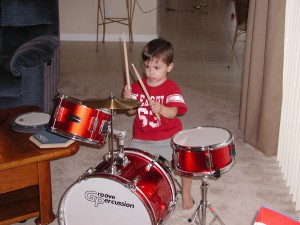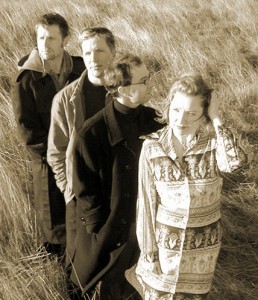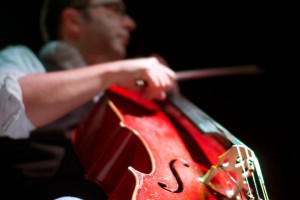auditions
cello, music, pictures, Portland, sad, true 1 Comment »Sorry for the silence on the blog front. I’m sure that those of you who’ve been checking in here at BFS&T know by now that when I don’t write anything for a while, it usually means that I’ve been experiencing a deluge of activity in real life, which leaves precious little time for reflection, let alone writing. This time has certainly been no exception, with lots of out-of-town gigs, lots of recording, and lots of gallivanting around the Pacific Northwest at all hours of the day and night. Here’s the view from the cabaret venue where PolishCellist and I played in Seattle a week ago:
IrishBand played in Astoria, Oregon last weekend, as part of a poetry festival that brought in the likes of Bill Carter. There was a freak snowstorm that night, and we somehow found ourselves in the midst of a snowball fight or three, always with random people. That was probably my favorite memory of the trip. Also, should you find yourself in that neck of the woods, you owe it to yourself to pay a visit to Clemente’s restaurant. Their food is incredible, and they treated us like royalty during our stay there. We became fast friends with the owners and staff.
In the midst of all this, my friend and I started a new band in which she sings and writes lyrics and melodies, while I write the music and play all the instruments on our recordings. So far, I’ve been playing acoustic guitar at our gigs, but the recordings have lots of other instruments, so naturally, the subject of finding more band members arose. I’ve been involved with the singer-songwriter scene for the last ten years, in which the members may change many times. I’ve also been invited to join existing bands, whether to replace a member who has left, or to bring my own particular type of musicality to the band. It’s been a really long time since I’ve played an active role in recruiting band members for a project of my own. It’s exciting and daunting at the same time, and that calls for a story.
For about four years, I was the lead guitarist and producer for a woman who, for the pseudonymic purposes of this blog, will be called Bird. Our original plan was for me to be the bass player, since good bass players are so hard to find, but after auditioning a few guitarists (and realizing that the overwhelming majority of guitarists play in the exact same blues-based way, which was of no interest to us), we decided that I should have that role and that we should seek a bass player instead. We auditioned a couple of bassists, one of whom bragged about his ability to play the upright bass, but as soon as he pulled it out, it was obvious to us that he was clueless about it. We finally did find a really good player, who had actually auditioned for us as a guitarist first, but was still interested even after he found out about our change of plans.
Once that hurdle was behind us, the search was on for a drummer. The three of us knew that this would pose the biggest challenge, since good drummers are already scarce enough, and a newly-formed band has precious little to offer, financially speaking. We started by posting an ad on ListByCraig, which turned up the usual suspects of tire-kickers and carless (sometimes even drumless!) slackers. We then posted a free ad in MessengerGodAlternativePaper, which yielded us a couple of interesting prospects. ProspectOne, in his late twenties, showed up with an endless series of stories about bands he’d been in and tours he’d been on, and the layers of stickers adorning his drum cases lent credence to his stories. His playing, however, did not. He was horrendous, and if you closed your eyes, you’d have thought that a seven-year-old was behind the drums.  We slogged through three or four songs (he’d driven clear across town to play with us, after all), then thanked him and told him we’d let him know.
Not long after that fiasco, we drove out to BeaverSuburb to play with ProspectTwo, a guy in his mid-forties who was becoming overwhelmed by his career as a doctor, and who wanted to spice up his life by reconnecting with his love of playing the drums. He had a beautiful house, and a beautiful drum kit, and a beautiful PA system to sing through. He cooked beautiful frittatas for us (I had to check the spelling of ‘frittatas’ just now) and squeezed beautiful fresh orange juice for us by hand. He was a great guy, and extremely intelligent, and we quite enjoyed his company. His drumming, like that of the previous guy, left a bit to be desired. His skills were not nearly as lacking as the other guy’s, certainly, but his playing was far from solid, and despite all the positive qualities he offered, we knew he would never be able to meet our drumming needs.
After that round of auditions, we were starting to become disillusioned, and (if I’m going to be completely honest) even a bit jaded. We tried a new tactic, which was to actually pay money and place an ad in the Musicians Wanted section of the main weekly alternative paper in town, which provided us with a distinctly higher caliber of applicants. The next person we auditioned was amazing. He had just moved to Portland, he was a great player, and he had a great personality as well. We felt like the four of us gelled as musicians, and we sounded like a real band for the first time.  After we had played through our list of songs, we sat around and chatted about Life In General, and about Music, and about Other Stuff too. Before we knew it, another hour had passed. Then, the subject of Money came up, and the atmosphere in the room completely changed. He turned quiet and weird and defensive, and blurted out something about how he needed to be compensated for this and that if he was going to be in the band, and that he was used to making so much money in his other bands back in Colorado or wherever, and that if we couldn’t guarantee that much, he’d have to look elsewhere. We had no delusions of grandeur, and we made it clear to everyone potentially involved that this was a brand new band, and we might never make money, but we believed in what we were doing, and we expected all of the members to feel the same way. He made an awkward getaway, and the three of us were left scratching our heads. Years later, he became a well-respected drummer around town, but I daresay that most people will remember him for being robbed and assaulted in the middle of the night while riding his bike, then being run over by TWO different cars driven by drunks who were friends caravanning home after a night of partying. Both of them fled the scene. Drummer did not survive, and the one driver that was convicted was sentenced to an insultingly small fine, a few days in jail, and a short time in a drug treatment program. In a strange twist of musical fate, I was invited to play cello and accordion on a song that was written by a friend of mine a few months ago as a tribute to him. The song has recently been released, and I just saw an update on SocialNetwork that said it will be played on a local music ‘spotlight’ show tonight.
The final guy we met had also just moved to Portland from Yakima, which is where I grew up too. He asked lots of pertinent questions about the songs, and played very tastefully and dynamically. He even commented on Bird’s blue guitar, which he said matched his blue drum set, and meant that he was ‘in.’ He was our guy, and we all knew it. The lineup was complete.
The four of us played together for the next few years, until the electric version of the Bird band split up and morphed into an acoustic lineup that didn’t involve the three of us. But we’re all still friends, and Bassist and Drummer are still out and about. They even play together in a new incarnation of a really great band that’s been around for a while. Drummer was lucky enough to tour with the Canadian band The Paperboys, which was a tremendous opportunity, not least of which because they were his favorite band.
We tried out a keyboard player for a month or two, but he could never make time to rehearse with us or learn the songs, and he was going to Australia, and he always wanted to come to my place and videotape my hands when I played the parts, so that he could learn them exactly. He always seemed to have a reason why he didn’t know the songs. To be fair to him, he was a genuinely nice guy, and he even came to watch a couple of our early shows, but it didn’t quite work to have him in the band.
This is what the audition process is like, ladies and gentlemen. It’s challenging, and grueling, and fun, and interesting, and frustrating, but ultimately rewarding, and it’s a necessary part of the musical life. The good news is that I’m not just starting out anymore, and I know a bunch of people, and I have lots more experience under my metaphorical belt, and I have a MOSTLY good reputation, but it’s still going to be a tough process. Who knows; I may even end up being the drummer in this new band. For now, the biggest news is that the two of us submitted a song to the annual compilation of up-and-coming Portland bands, and we’ll find out this spring if we make the cut or not. IrishBand submitted a song too, and both songs are very unusual in the overall Portland ‘scene’, which I believe will help our chances immensely.
Naturally, I’ll keep you posted.










